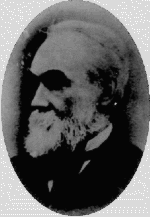John Hughlings Jackson
John Hughlings Jackson, FRS (March 4, 1835 - October 7, 1911), was an English neurologist; born at Providence Green, Green Hammerton, Yorkshire.
| Born in England, Jackson first became interested in neurology when he became a staff member of the National Hospital Queen’s Square. There began his first stimulation in the study of seizures. He gained importance, not on his description of a certain seizure pattern "Jacksonian Epilepsy," but on his formulation of concepts even principles that explain paroxysmal seizures of all types. He also postulated truly evolutionary levels of the sensori-motor mechanisms-the lowest spinal cord, medulla and pons, the middle, the rolandic region, and the highest level, the prefrontal lobes. As a neurologist, he published some 300 papers mostly in obscure journals. |  |
He was the son of Samuel Jackson, a yeoman who owned and farmed his land, and the former Sarah Hughlings, the daughter of a Welsh revenue collector. His mother died just over a year after giving birth to him. He had three brothers and a sister; his brothers emigrated to New Zealand and his sister married a physician.
He was physician to the London Hospital and later to the then National Hospital for Paralysis and Epilepsy located in Queen Square, London (now the National Hospital for Neurology and Neurosurgery). He was elected a Fellow of the Royal Society in 1878.
Jackson was an innovative thinker and a prolific and lucid, if sometimes repetitious, writer. Though his range of interests was wide, he is best remembered for his seminal contributions to the diagnosis and understanding of epilepsy in all its forms and complexities. His name is attached eponymously to the characteristic "march" of symptoms in focal motor seizures and to the so-called "dreamy state" of psychomotor seizures of temporal lobe origin. His papers on the latter variety of epilepsy have seldom been bettered in their descriptive clinical detail or in their analysis of the relationship of psychomotor epilepsy to various patterns of pathological automatism and other mental and behavioural disorders.
Jackson had no possibility of recourse to modern sophisticated neuro-investigative technology, but had to rely upon his own powers of clinical observation and deductive logic. Some of his eminent successors in the field of British neurology have been critical of many of his theories and concepts; but as Sir Francis Walshe remarked of his work in 1943, " ... when all that is obsolete or irrelevant is discarded there remains a rich treasure of physiological insight we cannot afford to ignore."
Together with his friends David Ferrier and James Crichton-Browne, two eminent neurologists of his time, Jackson was one of the founders of the important Brain journal, which was dedicated to the interaction between experimental and clinical neurology (still being published today). Its inaugural issue came to light in 1878.
In 1892, Jackson was one of the founding members of the National Society for the Employment of Epileptics (now the National Society for Epilepsy), along with Sir William Gowers and David Ferrier.